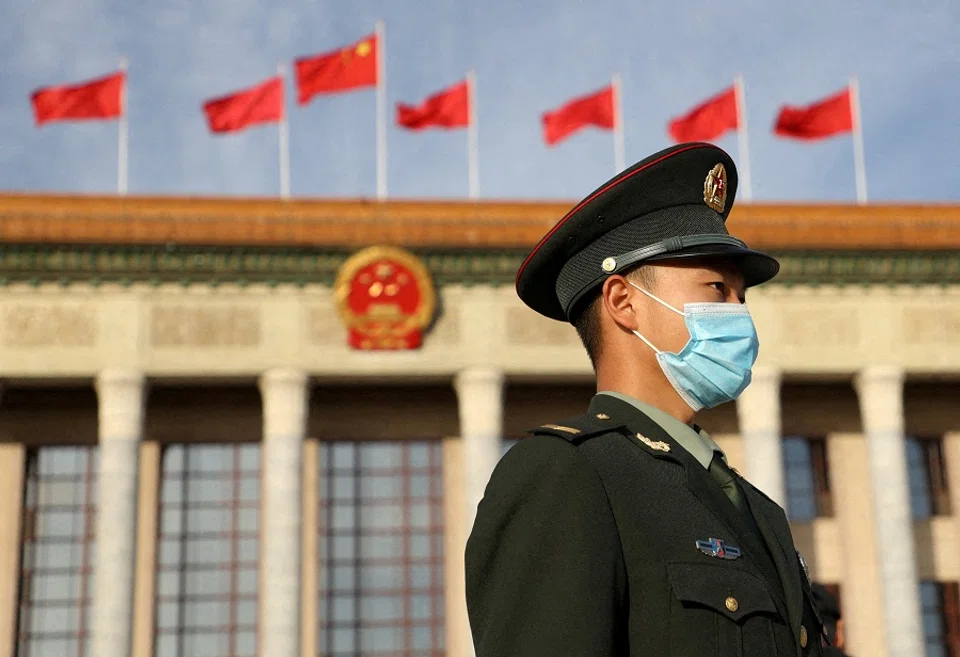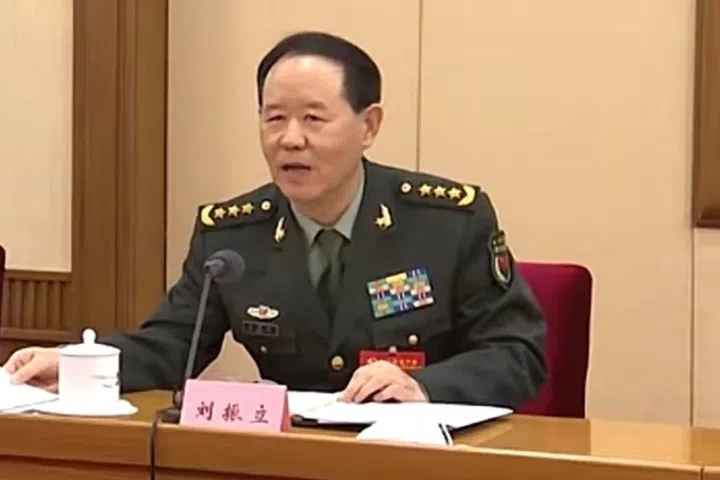China remains without a defence minister: Who can Xi Jinping trust?
In one fell swoop, China has removed two of its five state councilors. While anti-corruption efforts in China have been ongoing for a decade, corruption within the system remains widespread. Lianhe Zaobao associate editor Han Yong Hong highlights what to expect for the currently vacant post of defence minister and how anti-corruption efforts will come into play in appointing the next minister.

After disappearing for nearly two months, Chinese Minister of National Defense Li Shangfu has been officially removed from his position.
Defence minister post remains vacant
At the Standing Committee of the National People's Congress (NPC) meeting that concluded on 24 October, Li was removed from his three posts as state councilor, defence minister and member of the Central Military Commission (CMC). Scandal-plagued Qin Gang, who had already been removed from his foreign minister position in July, was also removed from the post of state councilor at the meeting.
Li and Qin became the Chinese Communist Party (CCP)'s shortest-serving defence and foreign ministers respectively since the founding of the nation, each serving for seven months. The number of Chinese state councilors at the sub-national level (副国级) thus dropped from five to three. In other words, the Standing Committee of the NPC removed two state councilors in one fell swoop on 24 October.
... General Liu Zhenli, chief of staff of the CMC's Joint Staff Department, was most likely to get promoted due to his age and actual combat experience, he did not replace Li as defence minister, leaving the post vacant for now.

The authorities have remained tight-lipped about the reasons leading to the removal of Li and Qin from their positions and the nature of the problem. Nonetheless, Li's removal was expected, given that he had already disappeared from public view for eight weeks, and rumours of corruption have been flying.
Most unexpected was the fact that the NPC did not announce Li's replacement. While the outside world had previously speculated that General Liu Zhenli, chief of staff of the CMC's Joint Staff Department, was most likely to get promoted due to his age and actual combat experience, he did not replace Li as defence minister, leaving the post vacant for now.
This vacancy could last for a month or two, or even until next year. This is because, based on China's constitution, the NPC exercises the right to elect or decide on the appointment of leaders of state organs. When the NPC is not in session, the Standing Committee of the NPC decides on ministers of the State Council based on the nomination by the premier.

The Standing Committee of the NPC usually meets once every two months - the current Standing Committee of the 14th NPC has had six sessions over this year in early March, late April, late June, late July, early September and late October.
The next session, when the new defence minister could be announced, may not be held until December. It remains a question whether Liu will be appointed as per the speculations of most parties.
... China's higher-ups now think that it is necessary to conduct a rigorous vetting process and to have a clear grasp of the candidate and all other parties involved before important personnel are appointed...
Slew of military dismissals and investigations
Fifty-nine-year-old Liu is currently the youngest member of the CMC and the youngest general in service. He ranks just below Li, reflecting the recognition of his abilities and potential.
Like current CMC vice-chair General Zhang Youxia, Liu is one of the few senior officials in the CMC with actual combat experience. Liu and Zhang had served in the Sino-Vietnamese War and fought on the frontline during the intense Battle of Laoshan in the 1980s, achieving important military successes.

The difficulty in appointing a new defence minister could be that, after the fall of Li, Rocket Force commanders and others, China's higher-ups now think that it is necessary to conduct a rigorous vetting process and to have a clear grasp of the candidate and all other parties involved before important personnel are appointed - there is no rush to fill the vacancy. Ultimately, the difficulty in selecting a defence minister also reflects the difficulty in choosing a person who can be trusted.
It is believed that Li is in trouble from his tenure as the minister of the Equipment Development Department of the CMC due to issues related to military procurement. There is also much interest in how big the case might get, and whether his predecessor Zhang Youxia will also be implicated.
... it is said that more than 1,000 individuals are being investigated, including high-level executives of the four major central military enterprises.
Since the middle of this year, incidents such as the removal of the top two generals of the Rocket Force, and the absence of Strategic Support Force commander Ju Qiansheng from two important public events, have highlighted the breadth and depth of the restructuring efforts of the Chinese military.
Some individuals under investigation are providing information on others to protect themselves, and it is said that more than 1,000 individuals are being investigated, including high-level executives of the four major central military enterprises. Given the force of military restructuring efforts in recent months, this figure is not surprising.

In terms of the impact of Li's downfall on the military, his removal is unlikely to have a significant impact on the combat capabilities of the People's Liberation Army, given that the defence minister primarily deals with military diplomacy and is more about ceremonial functions than specific operational responsibilities.
Long-term effectiveness of anti-corruption efforts
However, the rapid and frequent removal of senior personnel in key areas raises concerns about the stability of China's leadership. On the one hand, the top leadership is demonstrating a strong stance against corruption, particularly targeting the Equipment Development Department, which has been described as having the most opportunities for corruption.
Also, according to Caixin, 36 central party and government officials have been investigated and punished as of September this year, surpassing the total from the previous year. This indicates that there are still corrupt officials who are not deterred even after the 18th Party Congress.
On the other hand, people may feel unsettled about frequent personnel changes. At a time when the economy needs to be revived, this does not help create a governance environment where officials feel empowered to take risks, and might even fuel a climate of inaction.
Why is corruption so persistent? Anti-corruption efforts in China have been ongoing for a decade, but corruption within the system remains widespread. There are several analyses of the reasons, including the highly centralised and unified nature of China's political system, the limited power of bottom-up grassroots and media oversight, and a lack of transparency in information.
To prevent corruption at a lower cost and with long-term effectiveness, transparency of information and civilian oversight are essential.

To address the insurmountable risk of corruption and to prevent being duped by the corrupt combining forces, the CCP conducts extensive ideological education and implements an inspection system whose means and forms for implementation are ever-increasing, such as comprehensive inspection (全覆盖), retrospective inspection (回头看) which follows regular inspection, and dynamic (机动式) inspection.
However, the essence of these inspections is still a campaign-style approach to fighting corruption, which may yield short-term results but can lead to negative effects over time, such as individuals harbouring hopes for a fluke or circumventing the law. Besides, it is also a very resource-intensive process.
To prevent corruption at a lower cost and with long-term effectiveness, transparency of information and civilian oversight are essential. Otherwise, the effectiveness and appreciation of anti-corruption efforts will decline, as already evidenced by the recent removals of officials.
This article was first published in Lianhe Zaobao as "李尚福落马凸显的反腐难题".



![[Photos] Fact versus fiction: The portrayal of WWII anti-Japanese martyrs in Taiwan](https://cassette.sphdigital.com.sg/image/thinkchina/3494f8bd481870f7c65b881fd21a3fd733f573f23232376e39c532a2c7593cbc)

